De Spaanse dichter en toneelschrijver Federico Garcia Lorca werd geboren op 5 juni 1898 in Fuente Vaqueros, Granada. Zie ook alle tags voor Federico Garcia Lorca op dit blog.
Struikje Struikje
Struikje struikje
dor en groen.
Het meisje met het knappe snoetje
plukt olijven op het veld.
De wind die van de torens houdt,
slaat zijn armen om haar heupen.
Vier ruiters komen voorbij
op Andalusische paardjes,
in het blauw en het groen
met langere donkere mantels.
“Kom mee naar Córdoba, lief kind.”
Het meisje luistert niet.
Drie jonge torero’s komen voorbij
in oranje pakken
en slank van lijf,
met degens van belegen zilver.
“Kom mee naar Sevilla, lief kind.”
Het meisje luistert niet.
Als de avondhemel paars kleurt,
komt in het wazige schemerdonker
een jongeman voorbij
met rozen en mirten van maanlicht.
“Kom mee naar Granada, lief kind.”
En het meisje luistert niet.
Het meisje met het knappe snoetje
blijft maar olijven plukken,
met de grijze armen van de wind
om haar heupen.
Struikje struikje
dor en groen.
Vertaald door Bart Vonck
The Poet asks his Love to write
Visceral love, living death,
in vain, I wait your written word,
and consider, with the flower that withers,
I wish to lose you, if I have to live without self.
The air is undying: the inert rock
neither knows shadow, nor evades it.
And the heart, inside, has no use
for the honeyed frost the moon pours.
But I endured you: ripped open my veins,
a tiger, a dove, over your waist,
in a duel of teeth and lilies.
So fill my madness with speech,
or let me live in my calm
night of the soul, darkened for ever.
The Dawn
New York’s dawn holds
four mud pillars,
and a hurricane of black doves,
paddling in foul water.
New York’s dawn
moans on vast stairways,
searching on the ledges,
for anguished tuberoses.
Dawn breaks and no one’s mouth breathes it,
since hope and tomorrow, here, have no meaning.
Sometimes coins, furiously swarming,
stab and devour the abandoned children.
The first to go outside know in their bones
Paradise will not be there, nor wild loves.
They know they go to the swamp of law, and numbers,
to play without art, and labour without fruit.
The light is buried by chains and by noise,
in the shameless challenge, of rootless science.
All across the suburbs, sleepless crowds stumble,
as if saved, by the moment, from a shipwreck of blood.
Vertaald door A. S. Kline
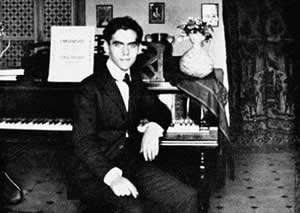
De Nederlandse dichter en schrijver Adriaan Morriën werd geboren op 5 juni 1912 in Amsterdam. Zie ook alle tags voor Adriaan Morriën op dit blog.
Ik heb mijn vader vergeven
Ik heb mijn vader vergeven
dat hij mij geboren liet worden,
sinds ik mijzelf niet vergeven kan
dat ik mijn dochters liet ontstaan.
Ik ben schuldig aan hun leven.
Alleen zij kunnen, later
als zij hun schuld ontdekken,
mij vergeven.
Een duizendkunstenaar
Hij kan een veer wegblazen,
een vingerhoed optillen,
een bladzij in een boek omslaan
met de namen van alle duivelen.
Hij kan een hand vol zand
leeg laten lopen op het strand
uitkijkend op de golven
die elkaar steeds weer bedelven.
Hij kan een meisje aanzien
met zoveel liefde in zijn blik
dat zij zich tot hem richt
en vuur vraagt voor haar sigaret.
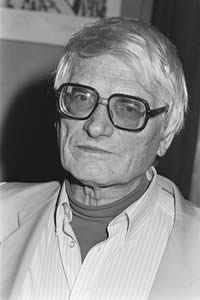
De Engelse schrijver Ken Follett werd geboren op 5 juni 1949 in Cardiff, Wales. Zie ook alle tags voor Ken Follett op dit blog.
Uit: The Pillars of the Earth
“When the house was finished it would be the most luxurious home for miles around. The ground floor would be a spacious undercroft, for storage, with a curved vault for a ceiling, so that it would not catch fire. The hall, where people actually lived, would be above, reached by an outside staircase, its height making it hard to attack and easy to defend. Against the hall wall there would be a chimney, to take away the smoke of the fire. This was a radical innovation: Tom had only ever seen one house with a chimney, but it had struck him as such a good idea that he was determined to copy it. At one end of the house, over the hall, there would be a small bedroom, for that was what earls’ daughters demanded nowadays – they were too fine to sleep in the hall with the men and the serving-wenches and the hunting-dogs. The kitchen would be a separate building, for every kitchen caught fire sooner or later, and there was nothing for it but to build them far away from everything else and put up with lukewarm food.
Tom was making the doorway of the house. The doorposts would be rounded to look like columns – a touch of distinction for the noble newly-weds who were to live here. With his eye on the shaped wooden template he was using as a guide, Tom set his iron chisel obliquely against the stone and tapped it gently with the big wooden hammer. A small shower of fragments fell away from the surface, leaving the shape a little rounder. He did it again. Smooth enough for a cathedral.
He had worked on a cathedral once – Exeter. At first he had treated it like any other job. He had been angry and resentful when the master-builder had warned him that his work was not quite up to standard: he knew himself to be rather more careful than the average mason. But then he realised that the walls of a cathedral had to be not just good, but perfect. This was because the cathedral was for God, and also because the building was so big that the slightest lean in the walls, the merest variation from the absolutely true and level, could weaken the structure fatally.”
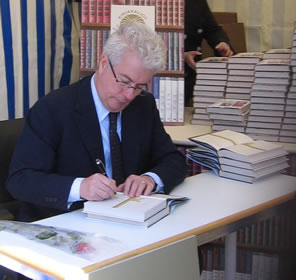
De Australische schrijfster Margo Lanagan werd geboren op 5 juni 1960 in Waratah, New South Wales. Zie ook alle tags voor Margo Lanagan op dit blog.
Uit: Red Spikes
“Check for sleeping snakes,” Mum said when they reached the creek side, where the ground was flatter. “Bang about a bit.” So everyone stamped around in their pajamas. It would have been funny if Dylan hadn’t been so frightened. Weren’t they worried about that bear? Weren’t they upset about what had happened? It was eerie that they were positioning air mattresses and spreading blankets and plumping pillows. Titch and Edwin were already asleep–look at them. They hadn’t even cried. It was all a dream to them. Dylan pinched the inside of his elbow hard; he rubbed his arm roughly against a tree trunk; he breathed in and stared at the frills of white water along the creek, at the shadow people and the shadow trees, at the millions of stars above among the needly casuarina twigs. He smelled the smoke from the hut chimney. That funny man must be building up the fire. You needed boiling water when a baby was coming. What for? Dylan couldn’t remember.
“Come on, Dylan. Come and settle down between Dad and me. We’ll protect you against jibber-jabbers.” Her smile was the only part of her face that was moonlit. “Jibber-jabbers,” said Dad dozily. “That’s going back a long way. What were those things, anyway, Dyl? You never told us properly; you were too scared even to talk about that nightmare.” Dylan crawled up the valley between them, laid his head in the pillow cleft, and shuddered. “They were these horrible creatures, hundreds of them, about up to my shoulders. They had big heads, big jaws, lots of teeth. Jibbrah-jibbrah, they said, jibbrah-jibbrah-jibbrah-jibbrah. They rushed at me out of the wardrobe and snapped their teeth.” Dad snored gently.
“I still don’t like to think about them,” Dylan said to Mum.
“Don’t, then,” said Mum comfortably. “I don’t know where they came from in the first place–some movie? None of the others had such night terrors.” She closed her eyes with decision. She always knew what to do. Dylan tried to be as firm about closing his”.
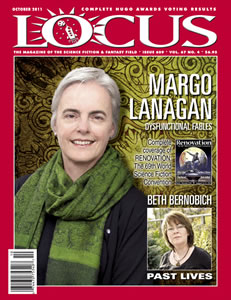
De Nederlandse literair criticus Carel Peeters werd geboren in Nijmegen op 5 juni 1944. Zie ook alle tags voor Carel Peeters op dit blog.
Uit: Het licht tussen de woorden
“Met Kees Fens heb ik altijd zo mijn problemen gehad als ik zijn kritieken, eerst in het dagblad De Tijd en later in de Volkskrant, las. In het kielzog van het tijdschrift Merlyn vertolkte hij een standpunt dat lijnrecht inging tegen mijn eigen gedachten over de betekenis en de werking van literatuur. De consequentie van het leerstuk van ‘de autonomie van het literaire kunstwerk’ waar Fens zich een aanhanger van toonde, was dat de literatuur zichzelf genoeg was. Wie een boek gelezen had, had een aantal uren op een fictioneel eiland doorgebracht. Dat een boek tijdens en na het lezen een bepaalde invloed op de lezer uitoefende en dat het iets zou kunnen betekenen binnen de cultuur, viel buiten het leerstuk en daar werd dus niet over gepraat. Dat zou al gauw leiden tot filosofie, psychologie, cultuurgeschiedenis en wereldbeschouwing en dat waren nu juist gebieden die Merlyn buiten de literatuur wilde houden. Dat er sprake zou kunnen zijn van wisselwerking tussen literatuur en werkelijkheid werd door Kees Fens en J.J. Oversteegen genegeerd, onder meer op grond van de theorie dat het literaire kunstwerk ‘fictie’ was. Ook het leven van een schrijver mocht op geen enkele manier in de overwegingen van een kritiek betrokken worden en de criticus zelf moest een ‘teruggetrokken’ positie innemen, zich zakelijk bij de tekst houden zodat zijn persoon niet in een kritiek te herkennen zou zijn. Deze instelling vond globaal zijn uitdrukking in de bundels waarin Fens zijn eerste essays en kritieken verzamelde, De eigenzinnigheid van de literatuur en De gevestigde chaos.
Een uitvloeisel van de leer was dat Kees Fens zijn persoonlijke binding met het katholicisme scheidde van zijn werk als literair criticus, wat bij voorbeeld bleek uit zijn verdediging van Jan Wolkers tegen clericale aanvallen.”
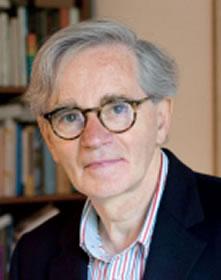
Zie voor nog meer schrijvers van de 5e juni ook mijn blog van 5 juni 2012 deel 2.
